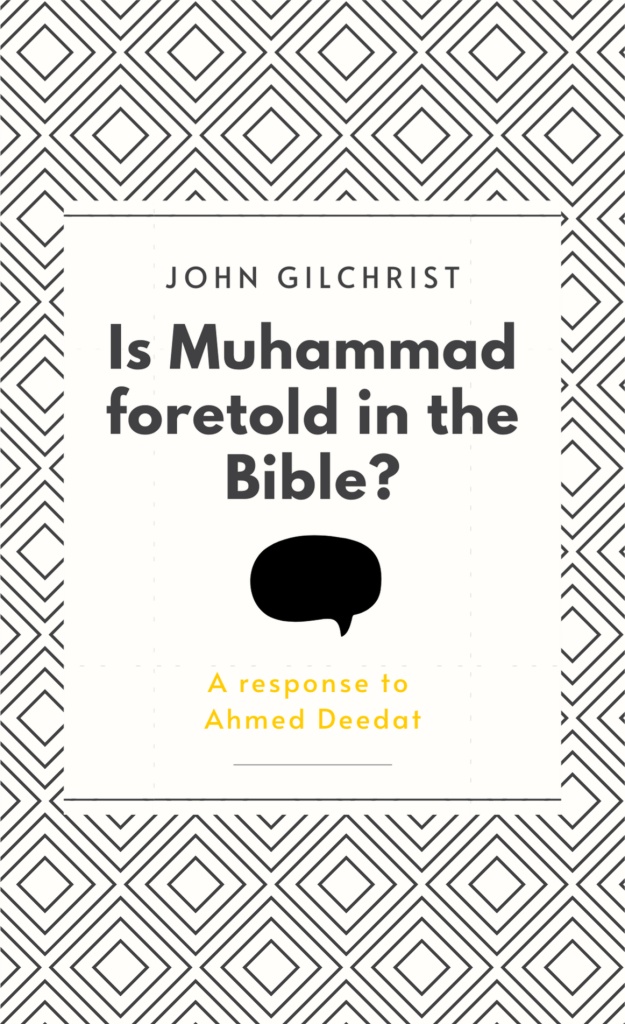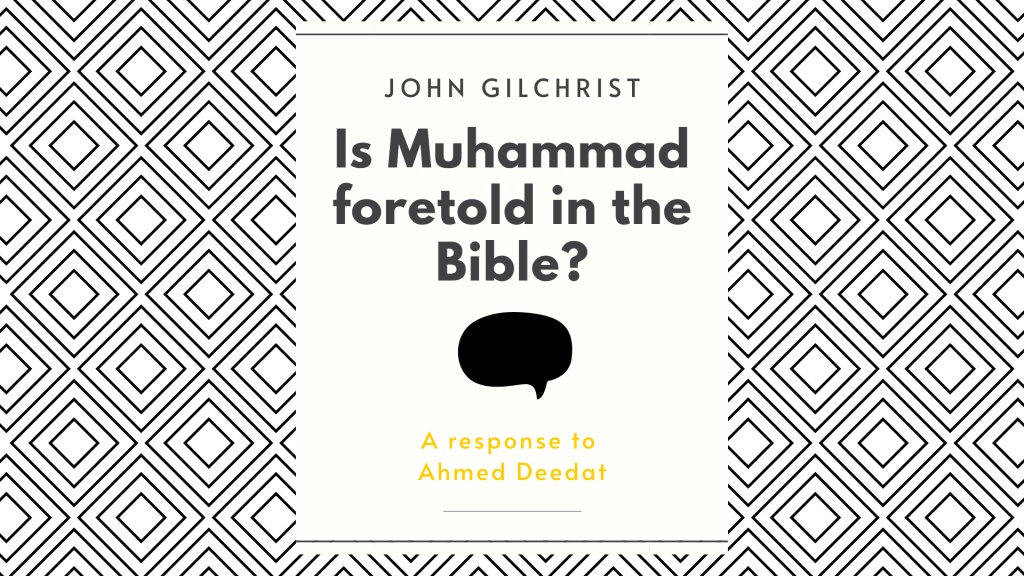Is Muhammad Foretold in the Bible?
A response to Ahmed Deedat by John Gilchrist


Chapters
During 1975 Ahmed Deedat held a series of lectures at the Durban City Hall, two of which set out to prove that Muhammad is foretold in the Bible. The first lecture, entitled What the Bible Says About Muhammad, dealt with the prophecy in Deuteronomy 18:18 in the Old Testament, and in it Mr. Deedat sought to show that Moses was predicting the coming of Muhammad when speaking of a prophet to follow him who would be like him. During 1976 Mr. Deedat published this lecture in booklet form under the same title. In his second lecture in 1975 he spoke on Muhammad the Natural Successor to Christ and here he endeavoured to prove that Jesus was foretelling the coming of Muhammad when he exhorted his disciples to wait for the coming of the one he called the Comforter who, he said, would follow him.
Deedat's lectures were typical of numerous similar attempts that have been made by Muslim writers over the years to make these two particular prophecies fit Muhammad. The effort has generally arisen from a verse in the Qur'an which states that the coming of Muhammad was foretold in the Jewish and the Christian Scriptures. It reads:
Those who follow the Apostle, the unlettered Prophet, whom they find mentioned in their own (Scriptures) - in the Law and the Gospel. Quran 7.157
It is not surprising, therefore, to find that Muslims have searched exhaustively through the "Law and the Gospel" (the Tawrat and the Injil, the Old and New Testaments respectively) for proof that these two books indeed contain prophecies of the coming of Muhammad. The Qur'an seems to suggest that these prophecies would be found in the Torah and the Gospel without much difficulty, but when Muslims have applied themselves to finding these alleged predictions, they have been unpleasantly surprised to discover that in these two books it is Jesus who is the subject of the many prophecies in them and not Muhammad. The birth of Jesus, his ministry, parables, miracles, crucifixion, resurrection, ascension, second coming, deity, glory and honour are the concerns of the prophetic texts of the Torah and the Gospel, and so extensively do these prophecies herald his advent as the ultimate climax of God's revealed truth and love towards men that one cannot help but be struck by the fact that the Bible makes no allowance for the anti-climax of a "prophet" to follow him. Such prophecies are conspicuous only by their absence.
Nevertheless, spurred on by the assurance in the Qur'an that the Bible indeed foretells the coming of Muhammad, Muslims have made every effort to find these prophecies. The obvious dearth of material in support of their quest has led most of them to wisely rely solely on the two prophecies we have already mentioned - one in each of the Testaments -, to prove their claim. Others, like Kaldani and Vidyarthy, have unwisely tried to apply every major prophecy in the Bible to Muhammad (including striking predictions of the crucifixion, atoning work and resurrection of Jesus Christ in Isaiah 53 for example!), but the shameless twists of interpretation that they have been compelled to resort to together with an abdication of all reason in their efforts to prove their points has fortunately restrained other Muslims from following in their steps and they have accordingly relied solely on the two prophecies we have mentioned, one by Moses and one by Jesus respectively.
We are in the circumstances entitled to presume that these two prophecies are believed by the Muslims to be the strongest in support of their claims. Accordingly, if it can be proved that these texts do not in any way refer to Muhammad, or anticipate his advent or prophethood, then the whole theory that Muhammad is foretold in the Bible must simultaneously fall to the ground.
We shall therefore in this booklet generously consider the strongest evidence of the Muslims that Muhammad is foretold in these two passages and will, in the light of the context of each passage, and of other factors crucial to a proper determination of the matter, decide whether the evidence is sufficient to prove the point or whether the case must ultimately be found to go against them.
It is universally accepted in all civilised communities that if a matter is to be determined properly, all the relevant evidence must be weighed together and all irrelevant evidence must be ignored accordingly. No matter how great the temptation may be to ignore the relevant facts while giving undue weight to the irrelevant ones if this is the only way a matter can be decided in one's favour, the man who really loves the truth and seeks for it will resist the temptation. It is our sincere hope that the Muslims who read this document will do likewise.